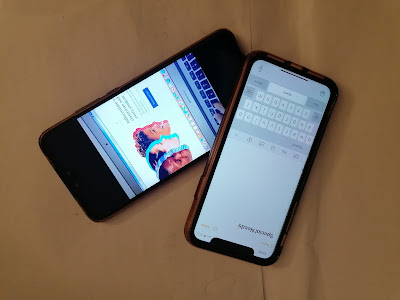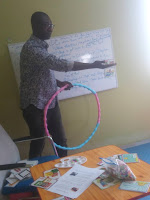Monday, 11 July 2022
Thursday, 1 April 2021
'Autism and Culture' series from the FERSA University of Cambridge Blog
Saturday, 2 January 2021
Digital Education Futures – The now and the future for Special Needs and Disability
Education is dynamic, especially for children with Special Educational Needs and Disabilities (SEND). The World Health Organisation suggests that approximately 15% of the global population live with some form of disability. The right education equips children with the skills useful into their future, and can lessen their marginalization.
Advances
in technology determine the skills needed for future jobs and meaningful
contribution to society. Using technology to create innovative approaches to
education can offer students the foundational skills that are desirable for future
work.
Covid-19
has resulted in school closures, government restrictions and changing public health
guidelines being implemented to keep learners safe. Models of learning largely
remain the same as public schools follow the national curricula. Only a few Ghanaian
educational institutions are focused on providing the necessary support and
interventions for SEND children unable to attend school.
The Government
of Ghana (Ghana Learning Television (GL-TV)) and some media houses broadcast
lessons for various subjects from kindergarten to secondary level. The only obvious
accommodation made for SEND children in this form of delivery is sign language
for the hearing impaired. While a few institutions provide some essential
support for their students, most public schools in Ghana lack these
opportunities. It is usually the case that low resourced educational
institutions have problems with the basic supply and provision of teaching and
learning materials.
Where
the delivery of education is virtual, the priority for Special Educational
Needs and Disability Coordinators (SENDCO)s, Inclusion managers and school
management remains providing the needed virtual support and intervention for students
with special needs. SENDCOs and teachers are concerned about their lack of
skills to implement virtual learning programs, which has meant leap-frogging
from face-to-face to virtual teaching.
Challenges
and solutions during Covid-19 Virtual Learning
There
are common barriers. These include access to quality broadband data, digital
technology tools, unaffordable software and/or archaic,
impractical equipment often donated by charitable organisations.
Supporting children/wards
during online learning, requires parents and caregivers drawing on extra skills
to address issues like Inattentiveness, noncompliance, frequently prompting children
to refocus, or going offline because children are unable to continue to partake
in sessions. Regarding autism, children are sometimes over-stimulated or
distracted when they use iPads or laptops. Trying to focus, follow instructions,
or other distractions like the novelty of new technologies (e.g. seeing
themselves on the monitors/screens) can affect learning in the home
environment. Of great concern is the digital safety of children, which is not
very well addressed when access to online facilities is given without properly
trained supervision. These concerns remind us of the sterling job teachers and
classroom assistants do to support SEND children.
Covid-19
has changed the status quo. Technology offers teletherapy, online training for
parents and professionals using tools such as Zoom and Telegram. There are other
excellent applications (Apps) and tools beneficial to explore. All stakeholders
(Teachers, therapists and parents) should be encouraged to embrace these
avenues even after Covid-19.
The
grim reality is that the disparity in access to good education and digital
technology grows wider in schools remaining closed until the unforeseeable
future (2021).
It is
encouraging that Covid 19 has thrown the spotlight on the virtual education and
the benefits offered if properly harnessed and supported.
How
do we look into the future?
Participation
in a globally-connected world, means having exciting models of education to be pursued.
●
Develop the individual strength of a person as opposed to a
group
Individualised learning based on subject areas and skills
that give a person the tools to gain skills for future employment. Involving
young people in the design of their own education and supporting them with
coaches, mentors and facilitators.
● Offer
Flexibility in education
Offering modules designed to be flexible and that can be
fitted in. Modules that are transferable into different models. e.g. WASSCE
grades transferable to GCSE O Level, Open Educational Resources or informal
online learning platforms like FutureLearn.
● Respond to
changing employment requirements
A flexible curriculum training people for global employment
in the future.
These
initiatives may seem complicated to explore especially in public schools and
institutions which are guided by the national curriculum. However, we must
continue to ensure inclusive and equitable quality education and promote
lifelong learning opportunities for all (SDG 4, UN).
By
Emmanuel
Ntow Nyarko: ARIS PLD Consultant and CEO ENNY Foundation &
Hannah
Ackom-Mensah: Researcher, AutismDTgh
Monday, 28 December 2020
Ideas for Teaching and Learning materials in 2021
Wednesday, 28 October 2020
Our networks during Covid-19 pandemic: Autism Awareness Care and Training Centre (AACT)
Autism Awareness Care and Training Centre (AACT) has always been of immense support to AutismDTgh, and continues to be a fountain of knowledge on Autism in Ghana.
AACT is an NGO, local support and education centre for children with autism in Ghana.
https://m.facebook.com/profile.php?id=230175567121419&__tn__=C-R
https://twitter.com/aact_ghana?lang=en
AACT is moving to
Sunday, 25 October 2020
Our networks during Covid-19 pandemic: Enny Foundation
Enny Foundation continues to be a crucial part of our network especially during the Covid-19 pandemic.
https://www.facebook.com/ennyfoundation/
Autism Awareness Care and Training Centre (AACT) and AutismDTgh
Tuesday, 22 September 2020
Autism Basics for Parents and Caregivers (Part 1)
In collaboration with Tanzania Autism Resource Centre, AutismDTgh presented on Saturday 19th September 2020.
The presentation was in English and Swahili.
For further information, contact
Tuesday, 21 July 2020
Happy anniversary!!!
-From the Core Team
Joshua Addy
Nana Akua Owusu
Emmanuel Ntow Nyarko
Mrs. Serwah Quaynor
Hannah Ackom-Mensah




.jpg)
























